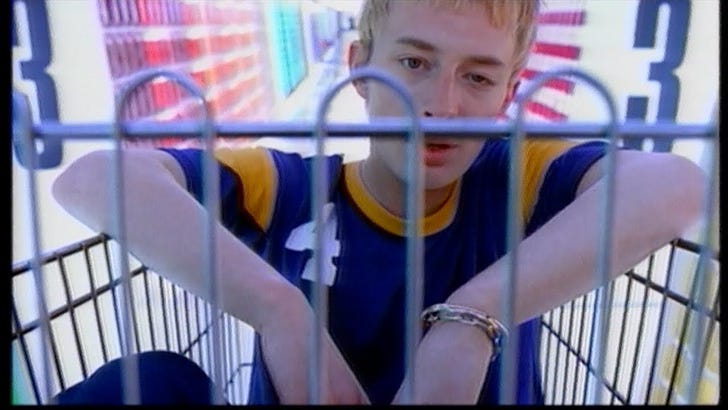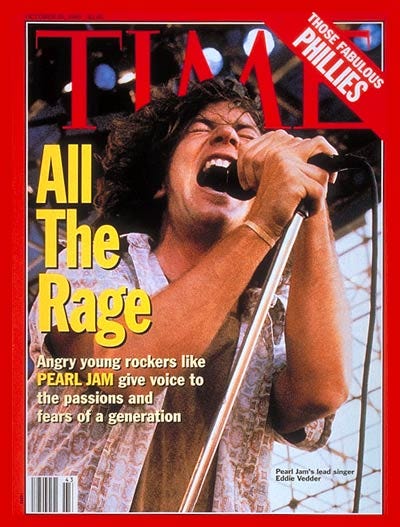How Much Money Would Be In Your Wallet if You Listened to Pearl Jam?
The Lingering Pain of Unheard Persuaders
What you listen to at the age of 21 permanently infects the soundtrack of existence. Turning 21 in 1995 turned out to be a glorious musical period.
Radiohead motivates make-out sessions to the most unromantic lyrics.
Hole offers dark, frenetic self-help advice.1
Smashing Pumpkins designs a catchy ode to human suffering
Nine Inch Nails suggests an upside to the darkside.
Oasis reminisces about attachment theory.
PJ Harvey offers a public service announcement that moms shouldn’t drown their daughters.
Alanis Morissette inspires kids to ask a lot of questions about sex.
And on the verge of turning 30, lead singer Eddie Vedder and the remaining members of Pearl Jam respond to absurd levels of financial success and popularity by using their newfound influence for good: protect fans from astronomical Ticketmaster service fees.
Ruined Concert Experiences
A study found that ticketing companies charge an average of 27% in fees to the price of concert tickets. “All the members of Pearl Jam remember what it’s like to be young and not have a lot of money…Many Pearl Jam fans are teenagers who do not have the money to pay $30 or more that is often charged for tickets today,” guitarist Stone Gossard reasoned. Swearing to keep concert tickets down, Pearl Jam showcased relentlessness.
First, Pearl Jam cut their salaries. In the 1990’s, Pearl Jam forged contracts with venue owners where their slice of merchandise sales would be used to lower ticket prices from the typical $24 to $18.
Second, Pearl Jam agreed to donate $20,000 from three shows to a children’s charity in their hometown. Ticketmaster refused to lower ticket prices without an additional $1 surcharge added in.
Sick of arguing with Ticketmaster, they produced a tour without their services. This meant forgoing the larger arenas with exclusive Ticketmaster affiliations. This meant having to cancel concert dates because sheriffs didn’t approve of safety precautions in alternative venues. Despite filing a monopoly complaint with the United States Department of Justice, the investigation closed without any action taken.
The Response to Defying the Status Quo
Pearl Jam became the public’s enemy, not Ticketmaster. Rolling Stone magazine didn’t write an expose on the heroic actions of Pearl Jam. Instead the magazine estimated in “Pearl Jam’s Road Woes” that the band lost 30 million dollars because of an audacity to feud with a corporate goliath.
During 14 months of failing to put together a tour without Ticketmaster’s connections, the fans expressed venomous sentiments. The band received voluminous hate mail.
As for solidarity from other musicians, only REM’s manager agreed to testify with them before congress. All those edgy alternative bands writing about the difficulty of the human condition in 1995? Raking in millions of dollars in touring revenue? Most worked with Ticketmaster on their 1995 tours. If a fan purchased a $40 ticket by phone (how antiquated), Ticketmaster would add a $6.50 surcharge.
The Modern Day Debacle
In 2010, Ticketmaster merged with Live Nation, the largest event promoter in the United States and now control approximately 70% of live events.
In 2022, fans of Taylor Swift gathered together for a class-action lawsuit against Ticketmaster for monopolistic prices and misleading conduct with exorbitant presale, sale, and resale products through their online platforms.
In 2023, a customer purchasing a $20 concert ticket is charged a service fee of $11.65, facility fee of $10, and processing fee of $5.50. Do the math and you pay $27.15 in fees when seeking out a $20 ticket.
In 2023, President Joe Biden introduced the “Junk Fee Prevention Act” to break the stranglehold of Ticketmaster and related corporate goliaths.
Imagine if we could put a price tag on the angst, lawyer fees, and hours of emails and calls related to this Ticketmaster price gouging issue. A colossal number that could have been averted with an appropriate sense of support instead of backlash to Pearl Jam.
Accept the Alliance Invitation Next Time
Another brave set of characters will refuse and resist nonsense tomorrow, and tomorrow, and tomorrow. If you are the persuader, be very detailed in how others will be helped by action. Deconstruct the financial penalties awaiting a typical 17-year-old music fan, adding up what they will pay in unwarranted fees over the course of a year, five years, and ten years. Let the audience experience what this confrontation is truly about. Be upfront about the inconveniences that await. Don’t let them be surprised by fewer tickets at the box office. Explain how this is the short-term pain for long-term benefits. Explain how you will bare this burden with wide-ranging costs in time, energy, attention, and finances. Your selflessness will be respected.
I admire Pearl Jam’s valor. They found sufficient cause to challenge Ticketmaster, took action when others saw the problem and relented, and continue to be on the right side of history. But they could have been successful by spending energy building alliances with other artists and communicating more effectively with industry insiders and fans.
We, the audience, deserve the blame for their failed efforts. A small inconvenience of not seeing a band we loved in a single year allowed a monopoly to continue siphoning money unfairly from patrons for 28 years and counting…
Every lawsuit and government intervention is a reminder of the power of Pearl Jam’s defiance. Pearl Jam will probably not get credit when Ticketmaster is deprived of junk fees.
Past dissenters are rarely remembered for their contributions to today’s campaigns. Do it anyway. Don’t do it for the glory. Courage and justice are ends in themselves.
Explore THE ART OF INSUBORDINATION
If you enjoy this newsletter, please check out my award-winning book, The Art of Insubordination: How to Dissent and Defy Effectively. This book offers a wide range of strategies for empowering minority voices to change minds (here and here). Send a copy to someone seeking to amplify their voice or a leader trying to facilitate productive conflicts.
And If You Missed the Last Issue…
An ever so slight influence on naming my daughter.





